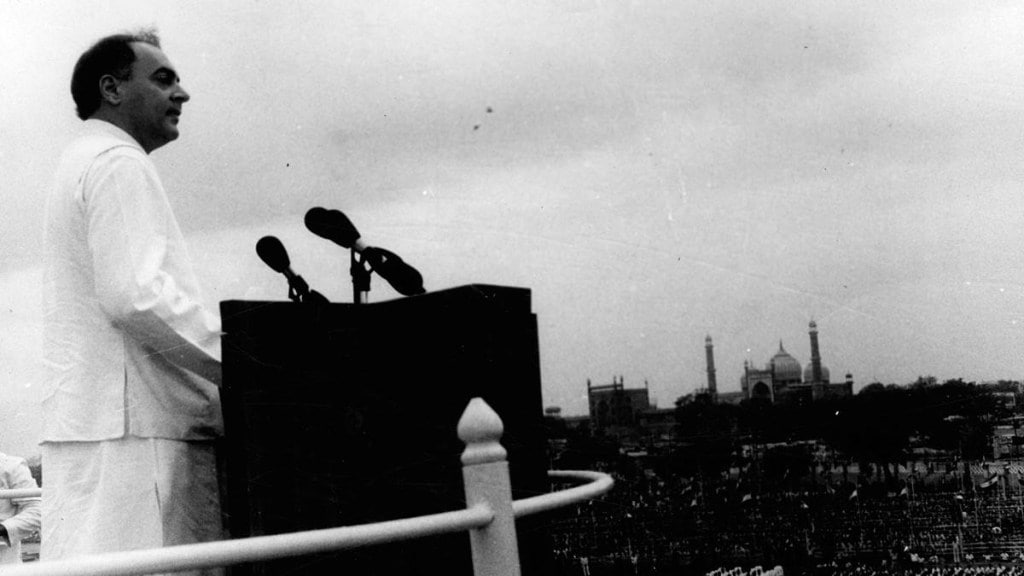The Congress party’s push for the inclusion of Other Backward Classes within the ambit of 33 per cent quota for women in the Lok Sabha and state assemblies has brought back the issue of reservations into political discourse just ahead of crucial five-state polls and the general elections.
Party MP Rahul Gandhi’s aggressive attempt to position Congress as a champion of the OBC cause, however, signals a marked departure from the party’s long-held stand on the issue of reservations.
Also Read: Caste census, OBC focus: In Rahul Gandhi’s push, a historic course correction for Congress
In a much-referenced speech in the Lok Sabha during a discussion on the ‘Mandal Commission Report and Measures for Promotion of Employment for Youth in addition to Reservations for Socially and Educationally Backward Classes’, former Prime Minister Rajiv Gandhi had taken a stern view of the decisions of the then National Front government led by Vishwanath Pratap Singh.
Gandhi, then Leader of Opposition in the Lok Sabha, raised questions on the intent of the government while pointing to a number of inadequacies in the Mandal Commission report itself.
Here are the edited excerpts from Rajiv Gandhi’s speech in Lok Sabha made on September 6, 1990, sourced verbatim from Parliament records:
Rajiv Gandhi (Amethi): Mr. Deputy Speaker, Sir… there has been, after a very long time, a caste tension like the one that has developed and the caste tension that we have seen today is on two levels—the first wave of caste tension was caused by the formula used by the National Front to get together, the AIGAR formula’. The AIGAR formula’ was the casteist formula and it brought back casteism to electoral policy after a break of approximately 10 years. If you think back, it was in 1980 that the Congress under the leadership of Indira Gandhiji, had raised the slogan “Na jaat par na patt par”
Syed Masudal Hossain: “Devraha Baba ki Laat par” (Interruptions)
Rajiv Gandhi: Sir, in this sort of a prevailing situation, with the pressures from outside and the pressures from within, what was needed was the soothing touch from the Government. Where the nation and our society needed a soothing touch, what does the Government go and do? They announce (Mandal report implementation) without preparing any ground. Mr. Indrajit Gupta who is a very responsible Member of this House, a very senior Member of this House and a very strong supporter of the Government, himself has said that—I think the words used are, “It was not done in a hurry,” something like that.
Indrajit Gupta: Hasty.
Rajiv Gandhi: It was hasty. Now. what does ‘hasty’ mean? *Hasty’ does not mean that it was hanging for 10 years, so you put on the switch and it comes out. ‘Hasty’ means that the ground has not been prepared and the proof that the ground has not been prepared is that people are getting killed outside, buses are getting burnt, trains are getting burnt and buildings are being destroyed. That is the proof.
Nathu Singh: What happened in 1975? (Interruptions)
Rajiv Gandhi: Sir, where on the one hand the Prime Minister is asking the nation to be psychologically prepared for war, he is doing exactly the opposite to the nation. He is causing rift in our society so that the nation can to be psychologically prepared to face the foreign threat of Pakistan like he has said. This is a totally irresponsible stand that the Government has taken.
Also Read: Women’s Reservation Bill incomplete without OBC quota, says Rahul Gandhi in Lok Sabha
There are a number of national goals. If we try to picture what the national goals are, each party will have a slightly different picture, but many items in that will be common and I think nobody in this House will say that the removal of backwardness and the removal of poverty are not part of that national goal. I think, equally nobody in this House will say that the removal of casteism is not part of that national goal. We must remember both.
When we think of poverty and backwardness, it is not just a question of righting a social wrong which has existed for many years. Today we need to harness all the energies of the nation to develop so fast as to compete with other countries. That can only be done if we harness all the resources of our people. That includes the weakest, the most backward, the poorest. They cannot be left out. I don’t think anybody In this House will say that when a child is born, there is a substantial difference in merit between one child and another child. They are all the same. The difference comes when equal opportunity is not given. The first thing in removing backwardness and poverty is to look at the root of the problem, give equal opportunity.
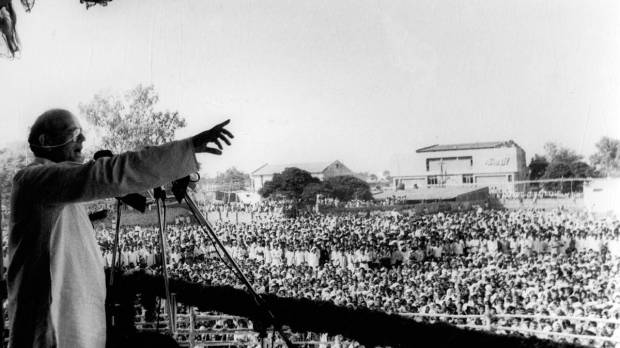
Whether that child is a Scheduled Caste or a Scheduled Tribe or a backward or a forward or a minority community of any religion, the merits are all there, but it does not get the opportunity to develop those merits and if he cannot develop them, the nation cannot use that at least for the development of the nation.
The problems of backwardness are very real and they cannot be handled just by looking at any one aspect. You cannot say that we will give only education, so backwardness will go. You will start hitting at the roots, but it will take a number of years; you cannot say that we will give financial assistance and backwardness will go. It will help, but you cannot say only reservations will do.
Also Read: OBC Quota: What is the 50% reservation cap and why Opposition wants the Modi government to quash it
The fact is that you need a comprehensive plan. You need a comprehensive vision you cannot look at these things in an isolated manner. We, the Congress, are in favour of a comprehensive action plan, an affirmative action plan for the backward communities. We need that. The problem cannot be solved by playing politics or by limited politically motivated manipulations.
Both of them, whether it is the Kalelkar Commission or the Mandal Commission, talk of very wide ranging, sweeping action that needs to be taken. We must remember that. The Congress is for such assistance to ‘Socially and Educationally Backward Classes’. That is what the constitution had said. But having said that we are in favour of all such measures. I am including ‘all’ because I believe some questions were raised yesterday in this House. The Congress is in favour of all such measures.
But I would like to emphasise the ‘but’—we would like that all such measures go to those groups of people within the SEBCs who deserve such help most. We are not in favour of having such measures being cornered by one particular group within the SEBCs. The benefits must seep down to those who need them the most.
Who are the groups, who are the people who are the more privileged among any group? I am not continuing this only to S.E.B.Cs. But when you want to give something, when you want to take some affirmative action, give something positive, you must accept that there are those people who perhaps though originally of a socially, educationally backward group, are today under no circumstances they can be described as socially and educationally backward.
I will give an example. Supposing we have a person who has been a Supreme Court judge for a number of years, say 10 or 15 years and then joins politics and becomes a Cabinet Minister, is he socially backward? Is he educationally backward? Do his children need help?
An Hon Member: How many?
Rajiv Gandhi: I am not saying how many. Even if there is one, that assistance should go to somebody else rather than to him. This is the point, (interruptions)
For example, do we want the benefit that the Government is giving to be cornered by the Ministers or the sons of Ministers or their families? Do we want the benefits that are being given by the Government to be cornered by big landlords and people who have a lot of property?
Second example is, do we want all these benefits to be cornered and taken away by land-holders and land lords? Why do we not exclude the people with a certain member of properties from such benefits? Do we want these benefits to go to high senior Government officers who already have got that privilege? Yes, they are a very few, I agree. But why should those few corner all the privileges?
Harish Pal (Meerut): Whether this was the only reason that you did not provide it to them during your tenure?
Rajiv Gandhi: I can’t help if you have objection and feeling hurt over it. (Interruptions) once an individual has risen above a certain level and becomes a doctor or a lawyer or an engineer or a professional, does his family need it or, should this benefit go to another socially, educationally backward who is less privileged and who will have less advantage? (Interruptions)
Do we want these benefits, for example, to go to taxpayers who are obviously in the upper class of society? There will be many other such groupings. It needs to be thought out a little more deeply, is the Government looking at one particular vested interest or is the Government really looking at the socially and educationally backward classes? This is the question I want to put to the Prime Minister.
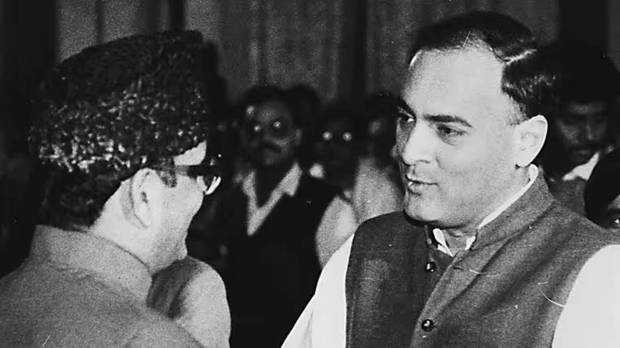
Prime Minister (Vishwanath Pratap Singh): The point I wanted to make is this. The Leader of the Opposition was making that certain persons, individuals who have risen above the economic strata, why are they being given this benefit. What is being addressed, the issue, is on the whole section of the society, backward educationally and socially backward classes, not socially and economically backward persons. This is the issue. When a class moves up, then, of course, weaning out can be there. But when the whole class is under just zero and one per cent, that is not the issue. The issue is whether the whole class has gone up or not. That is the issue.
Rajiv Gandhi: I think the Hon. Prime Minister has totally missed the point. The point is within a particular class, who do you want to help? Do you want to help those persons within a particular class who are already well-off?
An HON. Member: How many?
Rajiv Gandhi: I will answer how many. If the number is negligible, if the number is only one or two, then you should have no objection at all because you are only eliminating two cut of the 42 or 43 crores. What is your objection then? The fact is that within a class when you want to give some assistance, it should go to the poorest. I would recommend it…
The benefit from any such measure should not go to the privileged. They should instead be going to the landless; they should be going to the landless labour; they should be going to coolies, rikshaw-wallas, to nais to dhot)is, to these people who are definitely under-privileged in our society. And unless you take…
Ram Dhan: Dhobi (Washerman) is a Scheduled Caste and not a backward class.
Rajiv Gandhi: Ram Dhanji you may not be aware that there are dhobis (Washerman) among the Muslims also. (Interruptions)
Sir. it should go not only to such underprivileged groups and many others like them, but to people from all religions who are under-privileged and this is where I have a grave difference with what the Government is bringing in. They are looking almost entirely at caste… Not only that. They have not included very large sections of the minority who should be included. If you look at the Muslims, the vast majority of the Muslim community in India is backward educationally, socially, economically everywhere.
The same thing is true for Christians. The same thing is true even for Sikhs who are by and large okay, but there are still groups who are not all right. It is true for almost every religion as groups who are socially and educationally backward. Why should they not be included? The Government must explain this; the country wants to know.
The second point which must be a part of the national goal is a casteless society. The Constitution very clearly differentiates between Scheduled Castes and backward classes. Why did our Constitution makers make this distinction? They had something in their minds. Why have we lost that distinction today? I agree with you; the reality is that caste counts for a tremendous amount in this country. I don’t disagree with that. But what is our goal? Is our goal a casteless society? If our goal is a casteless society, surely every step that we take- we might have made mistakes in the past and I am including myself in that… (Interruptions)
NK Chatterjee: You are not sure, though.
Rajiv Gandhi: I am trying to keep the debate at a high level and on a serious plane. I am not being frivolous on any count and I would appreciate it if the Members especially from the Left parties whom I thought- well before they got into this alliance- were responsible members, who were principled members, who believed in certain things…
Somnath Chatterjee (Bolpur): Because of our sense of responsibility we have seen that you are there.
Rajiv Gandhi: Whatever we may see or we may not see, the question is that you are always there.
Somnath Chatterjee: The Leader of the Opposition of course is a self-confessed juvenile. He does not understand why he is there today, when in the earlier House he had 450 Members. How the poor people were alienated from the Congress Party, why the people have lost faith in them, he does not ask himself that. Whether I am here or not, whether I am there or not, I am for the ordinary people, the poor people, the struggling people of this country. We shall fight them and fight them everywhere. (Interruptions)
Rajiv Gandhi: The hon. Member is a very old Member of the House and I don’t want to contradict him. But while we may have lost confidence of the people, we still got 42% confidence of the people in the country. At what point of time have you crossed 5% or 6%?
Somnath Chatterjee: But we have never let down the people. (Interruptions)
Rajiv Gandhi: Sir. our goal today must be a casteless society. Let us be clear about that. (Interruptions) There has been enough of fun. Now please keep quiet.
Sir, do we still have that goal of a casteless society? I was a little worried when I heard Shri Indrajit Gupta speaking, because he drew a line. I think the line he drew was perhaps very fine; or like my friend is saying, it was a dotted line. If you believe In a casteless society, every major step you take, must be such that you move towards a casteless society. And you must avoid taking any step which takes you towards a caste-ridden society. Unfortunately, the step that we are taking today, the manner in which it has been put, is a casteist formula.
While accepting that caste is a reality, we must dilute that formula and break that formula by adding something on to it. So that at least we start inching away from the casteist formula. This is where I feel that the leftists are not carrying out their responsibility. And you should do that. It is within your powers to do it, it is not within our powers to do it. With a little bit of pressure, with a little bit of wobbling of that crutch, it can all happen. Therefore you have to do it. (interruptions)
NK Chatterjee: You are absolutely right. Whether the Left has influence on you or not. the Left has influence on the present Government. You are absolutely right. (Interruptions)
Rajiv Gandhi: This is exactly what I am trying to say. So, if the present Government goes in a casteist direction, you are partly responsible. You must bear that cross. You cannot wish it away. Here, I would like to ask the Prime Minister, a very specific question. Does he believe in a casteless society? It Is a specific question. “Do you personally believe in a casteless society, as the goal for a developing nation like India?” (Interruptions)
VP Singh: I am not going to reply now. I will reply later. You go on. (Interruptions)
Rajiv Gandhi: When you have replied to other question in the middle why can’t you reply to this specific question?
Sir, it is precisely what I feared. The Prime Minister does not have the guts to stand up and say whether he believes in a casteless society or does not believe in a casteless society. It is very sad. Sir, Raja Sahib is putting the caste into our society, once again. He is ensuring that caste does not go out by this action and by sticking to his guns on this issue of caste.
Ram Dhan (Lalganj): Which Raja Sahib? (interruptions)
Rajiv Gandhi: Raja Vishwanath Pratap Singhji.
Sir, this Government is creating a vested interest in casteism and the country is going to pay a very heavy price for this, Sir. (interruptions)
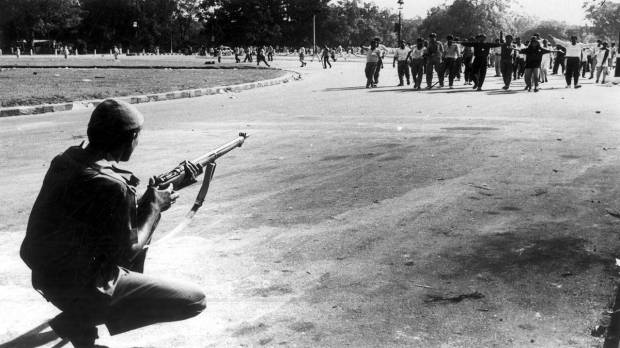
Sir, I would request the ‘Raja Sahib’ not to latch on to caste this way but to expand the definition of caste, first by including socially and educationally backward classes or backward groups-whatever you want to call it from other castes from within the Hindu religion and then expanding it to socially and economically backward groups from other religions, viz., Muslims, Christians, Sikhs, Buddhists, Parsis and others. All those classes that are socially and educationally backward should be first… (Interruptions)
VP Singh: I was asked a specific question about caste and I want to answer it straight… (Interruptions) …It is over… …I want to quote from Jawaharlal Nehru and I think, you may not hear me but hear Jawaharlal Nehru. Please do hot show disrespect for Pandit Jawaharlal Nehru. In one of his Parliamentary Party meetings, he talked about casteism as ‘you’ and he condemned It as he should as he had done but the fact remains.
That is what he says. He says that half a dozen or may be ten so-called superior castes dominate the Indian scene among the Hindus… (Interruptions) …There is no doubt about it. And if I talk about removal of casteism, do not understand that I want to perpetuate the present classification as some people at the top and other people at the bottom. So. this is what Jawaharlal Nehru has said. (Interruptions)
Rajiv Gandhi: Sir. I would like to convey to the hon. Prime Minister that I am perhaps more knowledgeable about what Panditji has said than himself. (Interruptions) …Sir, the question was very specific. Does the Prime Minister believe in a casteless society or not? I do not want to know what Panditji believed in. What does the Prime Minister believe in? I appreciate that It took the Prime Minister ten or twelve minutes-l do not know the exact time- to think about this. But I wonder whether this timing was worked out astrologically by the Cabinet Secretariat or not…. (Interruptions) …I noticed that that piece of paper that the hon. Prime Minister read was handed over to him from behind him, down the line. (Interruptions)
Raja Saheb has refused to say whether he believes in caste or not. Can I ask him another question?… (Interruptions) On many occasions, I believe, Raja Saheb has said that he is going to implement this Mandal Commission report in toto and it is only going to happen in a number of pieces, but it is going to happen in toto. This is what he has said on a number of occasions.
Let me read one sentence from here and again specifically ask Raja Saheb how he reacts to this… (Interruptions)
Also Read: We are all OBCs now! What happens to reservation cap if OBC share rises as it will?
Rajiv Gandhi: Mr. Mandal in para 12.11 is talking about the Hindu converts to other religions to Islam, Christianity and other religions. I read one part of the para: “This resulted in the Hindu converts inadvertently acting as Trojan horses of caste system amongst highly equalitarian religions such as Islam..” Does the Prime Minister believe that the converts to Islam are Trojan horses of Hinduism in Islam? I would like an answer to that.
For these measures to be truly beneficial to the socially and educationally backward, they must eliminate those among the socially and educationally backward who do not need such assistance. This is very important.
A lot has been said in this House about why the Congress Government when it was in power did not take action on the Mandal Commission report. We have been told: For ten years, the report was lying there, nothing happened: what was the Congress Party doing?
An Hon Member: Sleeping.
Rajiv Gandhi: No, we were not sleeping. Firstly, when implementing any such measure which has major social ramifications it is very important to lay the ground… This Government has not laid the ground. We may have erred on the soft side thinking we are taking too long to do it. We had a number of Cabinet meetings and the Prime Minister was the part of the Cabinet then. I don’t remember any vociferous comment at all at that time.
Does the Prime Minister believe that the converts to Islam are Trojan horses of Hinduism in Islam? I would like an answer to that. For these measures to be truly beneficial to the socially and educationally backward, they must eliminate those among the socially and educationally backward who do not need such assistance. This is very important.
Rajiv Gandhi: Now, I come to the second part of implementing this Report. Why we were having problems was that we wanted to focus the assistance and help in every area to those amongst SC/ST—the weakest and the poorest of the SC/ST—so that they could get the benefit. The third point is that there are many questions about the Mandal Commission Report itself. There are many contradictions in the Mandal Commission Report and I would just like at random to point out some in this House.
I am not saying that the Report is useless. There are tremendous merits in the Report but there are problems in the Report also. We must understand that. Let me first go to what the Mandal Report says about the Kaka Sahib Kalelkar Commission. In Para 1.9, when the Kaka Sahib Kalelkar Report was presented to the Government. The government said and I quote: “In view of the above, the Government considers it necessary “some positive and workable criteria” should be devised for the specification of the socially and educationally backward classes.”
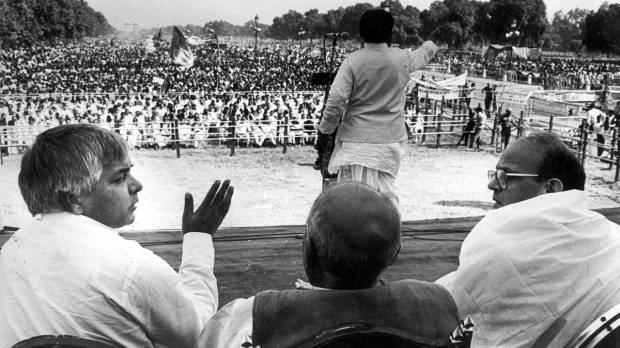
“One important reason as to why the Central Government could not accept the recommendation of the Kaka Sahib Kalelkar Commission was that it had not worked out objective tests and criteria for the proper classification of socially and educationally backward classes…”
“…In several petitions filed against reservation orders issued by some State Governments, the Supreme Court and various High Courts have also emphasised the imperative need for an empirical approach to the defining of socially and educationally backwardness or identification of other Backward Classes.”
Did the Mandal Commission give solid scientific foundations to the Commission’s findings? It is a big question… Sir, three important sociologists were involved with the Mandal Commission, Prof. B.K. Roy Burman, Prof. Srinivas and Prof. Jogendra Singh. They have been thanked. In the Preface of the Mandal Commission Report for the work they have done. But reading the newspapers recently, I found that they have declined the honour and they have clearly said that they were denied any real opportunity to participate in the findings.
I will repeat. The task of this team was solely to draw up a plan of studies-not to do the studies only but to draw up a plan of studies. They did not do the studies. This group was never consulted again. Then, the Srinivas Panel did meet only for five days. So, the Research team met for three days, the Srinivas Panel met for five days.
This Committee never met again, and was never consulted again. What i am trying to point out is not that this report is worthless, and should be thrown away. Like I said, there is substance in the report, but to say that you will just accept it like that, without discussing it or without debating it, is not adequate. It needs more looking into. (interruptions)
NK Chatterjee: What did you do for ten years?
Rajiv Gandhi: Forget ten years. We made a mistake. At least you should have read this report before making this announcement.
Paragraph 3.15 says: “On the basis of 1891 and 1931 Census, data was collected and analysed with a view to getting a frame for the linkage of traditional occupations by caste.
We are talking about data which is 100 years old or 60 years old. Can we really interpolate from 1891 and 1931 to 1990; or does something better needs to be done? The Commission thought it was inadequate; and he himself said he relied on three methods, because this data collection was not good enough. So. he himself rejected that at the beginning.
“Generally speaking, it was seen that the views of every individual… ” This is the response of individuals. “The views of every individual group and association were conditioned by their own class interests and the question of giving concessions to OBCs was surcharged with emotion.”
Also Read: Congress promises 75 per cent reservation if voted to power in Karnataka
That means, the input that he has got from individuals and associations has been very biased by the people who presented them. He then goes on to say: “It was but natural that most of the respondents appearing before the Commission belonged to the OBC.”
That means the inputs that he has got are not reliable as a cross-section of society. Coming back to the socio-educational survey, he says: “The results are exhaustively listed and reported in Chapter 11. But these surveys, the village surveys were only 810.”
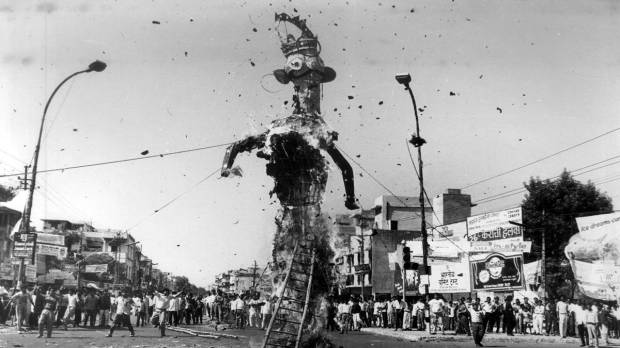
To do such a small sampling check is a valid step when you are checking the validity of a report. But is it a valid step on which to base a complete report like this? It is not only that. The Experts panel recommendation of the survey that was to be done was unilaterally rejected and changed, arbitrarily changed by the commission. He says this in para 11.10 and 11.15. (Interruptions)
Sir, the survey was conducted by junior Government officials without any supervision or checking or validation by any high ranking or known sociologist. This Is the basis of the data we have got.
Sir, the fact of the matter is that minorities have not got their just due… The fact of the matter is that by playing games this reservation, they have deliberately blocked the minorities from getting any benefit. The Prime Minister should answer how he is going to help the socially and educationally backward minority communities.
The next very important point is: On what basis has the Mandal Commission defined caste in its definition? How has the Mandal Commission reinterpreted the Constitution and changed backward classes to backward caste? In para 10.4… (Interruptions)
“Nearly 78 per cent of the respondents were of the view that caste should be accepted as a criterion. However, 28 per cent favoured the acceptance of caste as the sole criterion.” Only 28 per cent of the respondents favoured caste as the sole criterion. 78 per cent said that caste can be one of the criteria, but not the sole criterion.
And then he himself goes on to say: “Nearly 70 per cent were in favour of evolving multiple criteria based on social status, political influences, educational attainments, economic level, employment status, etc. Others favoured the including of place of habitation and financial position.”
I would like to link this to an earlier quotation that I made, where the Commission has said that most of the respondents were OBCs. So, most of the respondents who were OBCs have said that they do not want caste as the single definer… (Interruptions)
An Hon Member: We are glad that after so many years you are reading the Commission’s Report. (Interruptions)
Rajiv Gandhi: At least listen to me. Sir, on what basis then has this Government and the Mandal Commission accept caste as the sole definer?
Then again, there has been a methodology in collecting information. I won’t go into the quotations because obviously they are going over their heads now.-But again the
same thing. He has used four sources. One in himself. He has quoted the socio educational field survey. What was the socio educated field survey? Where was the scientific basis for this? He himself has described. His second item is the Census Report 1961.
What has the Census Report given us? He himself says: “Census Report, particularly for the Identification of primitive tribes, aboriginal tribes, forest tribes and indigenous tribes”. The third is his personal knowledge after visiting 37 villages. Thirty-seven villages and his personal knowledge give us the information. The fourth source is list of OBCs as prepared by various States.
Rajiv Gandhi: Let me ask you a specific question.You must have read at least the Recommendations chapter, if not anything else. (Interruptions) Then, I ask you specific questions on the Recommendations. Sir, the Commission has recommended specifically electorates based on caste. The Commission has recommended In para
13.37.4 which says:
“With a view to giving better representation to certain backward sections of O.B.Cs like the Gaddis in Himachal Pradesh, Neo-Buddhists in Maharashtra, Fishermen in the coastal areas, Gujjars in J.&K., it is recommended that areas of their concentration may be carved out into separate constituencies at the time of delimitation.”
Does the Government subscribe to the Mandal Commission view that political constituencies should be carved out on the caste basis? Are we going back to the Round Table Conference for having separate electorates? That was designed to break our country.
Does the Prime Minister accept this? it is a very serious question and on this question, I do not think either the BJP or the Left parties can avoid answer. They can afford to keep quiet..I do not mean politically because I know what is inside you and what you feel. I know the patriotism that is there. Can you stand by idly and allow this gentleman sitting here to have caste based electorates as Mr. Mandal recommends?
Then the Commission goes and has the caste as the sole identifier. Why are we sitting here accepting caste as the sole identifier? Do we not have a responsibility over and above what is written in this book? Do we not have to react? Is it not our responsibility sitting in this House to see that the nation is not divided, because somebody may have made a slip-up? Why are we here? Otherwise, they could sit here and such reports could be mandatory.
Then, the Commission says that the information supplied was very incomplete. What sort of information is this report based on? What is the substance of this? How can we just accept this as a fact and just bulldoze it through the nation? We have to be much more responsible than that.
To switch over from “class” as the definition to “caste” as the definition, the Commission quotes three Supreme Court judgments. But in the very report itself, there are at least three more Supreme Court judgements which say that you cannot define ‘class’ only on the basis of ‘castes’.
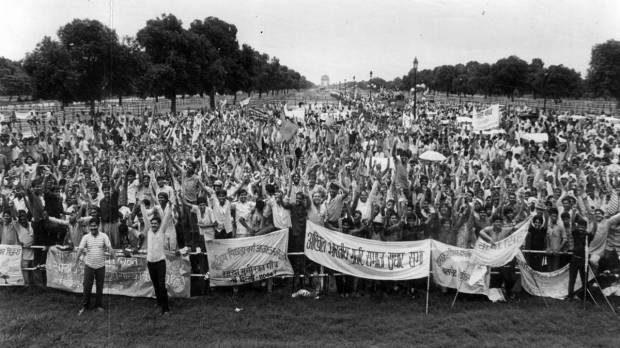
The Commission itself says that “caste” cannot be the only factor. The Supreme Court says that ‘caste’ cannot be the only factor and if it is so, it will be struck down. But here we are… happily sitting over here—representatives 500 of us. We are happily saying that ‘Yes’ caste can be a factor and caste must be the only factor. It is incredible that the Government has no comment at all on this report.
As I said at the beginning, the Congress is for all types of action including reservation to help socially and economically backward classes. I went beyond that. I said in general everything that has been recommended by the Mandal Commission and by the Kaka Saheb Kalelkar Commission, should be implemented but we have serious problems with certain definitions.
We have problems if the weakest amongst the classes are not helped and if the weakest among the minority religions are not helped. We have problems if caste is defined to enshrine casteism in our country. We have problems if casteism is going to be made a factor for parliamentary and Assembly Constituencies. The Congress cannot stand by and watch this nation being divided for the political convenience of one individual.
Before deciding on the action on a report which leaves so many questions… we may agree with many things. But there are things we disagree with, it would have been prudent on the part of the Government if it had called at least those friendly parties–we would have liked if they had called us also. At least If they had called their friendly parties and had a thorough discussion, I am sure that such lacunas would have been closed.
But, unfortunately, without thinking about it without even perhaps looking at the report, reading the report, you locked only at your manifesto which has 10 words about it and dived into it. Why did the Government not go into all these things much more seriously? Was the unity and integrity of the nation not important to this Government? Is it not important for you that children are getting killed In the street? Is it not important that caste violence is breaking out all over the country?
Out of the report, out of a holistic picture that Mr. Mandal has put, I have picked up lots of holes in how he has come to the conclusion. But in his conclusion, there are lots of things which are prudent, should be done. The question is have you done what Mr. Mandal wanted you to do? Have you taken his holistic picture? Or have you taken just one part of that for political convenience? Does Mr. Mandal in his Report consider any one part of his recommendations more important than the other? Has he given a priority to it? On what basis have you given a priority to it?
In fact, if I can quote from Mr. Mandal himself on what he thinks about his recommendations he says that reservations in Government employment which is the only thing that you have done. The reservations in Government employment and educational institutions as also all possible financial assistance are needed. He has listed three types of assistance out of which you have done only one. All this will remain palliative unless the problem of backwardness is tackled at its root. And then he goes on at great length on what should be done. But what did you do? You made it phase one, phase two phase three totally arbitrarily. You have not even put a time limit on the phases… (interruptions)
VP Singh: Will you put some time limit to the speech?
Rajiv Gandhi: No. I will not. Because the manner in which you have implemented the Mandal Commission, to me, it is breaking up my country. Break-up of my country may not be important to you…
We need a complete picture of what the Government wants to do. Do you want reservations? For how many sections do you want reservations? Are representations going to be proportional to the population as Mr. Mandal has recommended? An issue like reservation cannot be treated in a piecemeal manner. We must look at the whole picture. You must see. The Government must decide how many sections must get reservation, whether those sections are going to be part of the backward, the SEBCs or whether those Sections are going to be apart from SEBCs.
We must know clearly what proportion of seats is going to be kept open. Otherwise, we will not know what the final picture is going to become. We would like the Government to present a White Paper to this House, a White Paper which will suggest, first, the Government’s attitude towards the many incongruities in this report and how to correct them. Secondly how the implementation is to be done and how the recommendations are to be implemented.
Third, what is the total picture of reservations that they want and what proportion are they willing to leave open? This is also important so that the complete picture is in front of the nation when such a decision can be taken. We will participate fully in any such debate and I can assure you that such a national dialogue will reduce the tension that is taking place right across the country today.
Sir, that brings me to why all this is happening. If I can quote from an article in the ‘Independent’, in the last sentence, he (PM) says, “It was purely a political strategy”. He had to use that political strategy. And in the last part of the sentence, he says, “he was not foolish”. Perhaps, it got cancelled by implementing the first part of that sentence.
Why was this thing brought in in such a rush? I do not know because we are not privy to certain things. But, I believe that the implementation of the Mandal Commission Report was not even part of the Cabinet Agenda on the day it was brought in. It was put on the Table and it was passed in hurry because something was happening outside, that needed this thing to be done. What was happening outside? There was a rally taking place in Delhi. (Interruptions) Why was it necessary to rush into this Report? Because, if that rally got the support of certain Chief Ministers, then, there would be tremendous problems inside this House. So, to protect himself against internal party wranglings—and I charge you with this—you have taken the country to the edge of caste wars. (Interruptions)
Sir, Raja Sahib’s policies are not very different from what the Britishers were doing. It was the British who tried to divide our country on caste and religion and today it is the Raja Sahib, sitting there, who is trying to divide our country on caste and religion. (Interruptions) Already you are taking this country towards religious electorates.
Ministers are provoking caste wars and the Raja Sahib is quiet. Why is he not speaking now? Why is he not telling his Ministers to control themselves? If he cannot do this, is he part of the provocation that is killing people outside? Sir, socially and socially and educationally backward classes need all the help they can get including reservation and the Congress will support you in that. We would like that to be targeted to the poorest and the weakest in the socially and educationally backward classes. Congress Party has outlined this in the Working Committee’s Resolution on the 30th August this year.
I would like to appeal to this House, let us not have one man’s obstinacy holding India hostage, let that man’s obstinacy not lead to children getting killed, our children, Indian children getting killed on the streets.
Let that man’s obstinacy not lead to caste war…{Interruptions) Violence must end. I appeal to the whole House, I appeal to the patriotism and patriotic feelings of every member in this House not to remain idle, not to remain quiet and save this nation from the obstinacy of one person.
Thank you.

